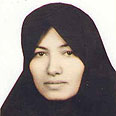
An Iranian woman whose sentencing to death by stoning has sparked international outrage has apparently confessed to adultery and talked about her husband's killing in a state television interview.
In the interview, aired on Wednesday night, Sakineh Mohammadi Ashtiani also criticized her lawyer for publicizing her case, saying it had brought shame on her family.
A human rights campaign group, the International Committee Against Stoning, called the TV show "toxic propaganda". Ashtiani had previously denied the adultery accusations against her.
International media attention given to the case has highlighted Iran's high number of executions and may have spared Ashtiani from being stoned to death, according to her lawyer, who has fled to Europe.
With her face blurred and her words voiced over to translate them into Farsi from local dialect, it was not immediately possible to independently verify the woman's identity.
Ashtiani described how she had struck up a relationship with her husband's cousin.
"He told me: 'Let's kill your husband'. I totally could not believe that my husband would be killed. I thought he was joking," said Ashtiani. "Later, I found out that killing was his profession.
"He came (to our house) and brought all the stuff. He brought electrical devices, plus wire and gloves. Later, he killed my husband by connecting him to the electricity," she said.
The head of the judiciary of Iran's East Azerbaijan province told the television show that Ashtiani had injected an anesthetic into her husband. "After the husband went unconscious, the real murderer killed the victim by connecting electricity to his neck," he said.
It was not clear whether the cousin had been arrested.
'Children completely traumatized'
Ashtiani, a mother of two, has already received 99 lashes for having an illicit relationship with two men. The stoning sentence has been suspended pending a judicial review but could still be carried out, an Iranian judiciary official has said.
Murder, adultery, rape, armed robbery, apostasy and drug trafficking are all punishable by death under Iran's sharia law, enforced since the 1979 Islamic Revolution.
Her lawyer, Mohammad Mostafaei, told Reuters in an interview earlier this week that Ashtiani, who was convicted of "adultery while being married", would likely be spared stoning thanks to international pressure.
Iranian authorities have issued a warrant for Mostafaei's arrest and held his wife in jail for two weeks in an attempt to get him to return to Iran, he said.
In the TV interview, Ashtiani said she would lodge a complaint against Mostafaei, who is now in Norway.
"Why did you publicize my case? Why did you harm my reputation and dignity? Not all of my relatives and family members knew that I am prison. Why did you do this to me?"
The show's host said Western media had given the case so much publicity in the hope of pressuring Iran to release three Americans who have been in prison for more than a year after being arrested near the Iraqi border where, their families say, they were hiking.
Attorney Mostafaei, who is currently in Norway after fleeing Iran, told CNN that the show his client appeared on is supervised by the ayatollah regime's intelligence services. "Many of the show's reports are false," he said, adding that Ashtiani is doing what she is told "to save her life."
"The main issue here is that she was sentenced to death for adultery," the lawyer said. "The international community demanded that she not be killed because of this. The Iranian television broadcast did not address this issue."
Attorney Houtan Kian, who is also representing Ashtiani, said his client was tortured and "forced" to make the comments on TV.
"She was severely beaten up and tortured until she accepted to appear in front of camera. Her 22-year-old son, Sajad and her 17-year-old daughter Saeedeh are completely traumatized by watching this program," he told the Guardian.
According to human rights group Amnesty International, Iran is second only to China in the number of people it executes. It put to death at least 346 people in 2008.
- Follow Ynetnews on Facebook















